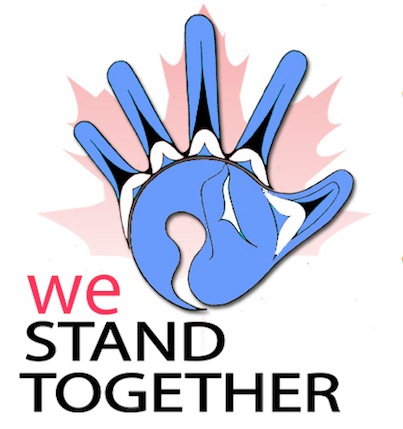Last week brought some bad news in the Hupacasath First Nation legal challenge to the Canada-China Foreign Investment Protection Agreement (FIPA). The case was dismissed with costs, despite the mountains of evidence that investment treaties like the FIPA subvert democracy and interfere with aboriginal rights. The chief justice (a Harper appointee) sided with federal government lawyers who argued there was no “causal link” between the FIPA and Indigenous rights — a position Grand Chief Stewart Philip says the UBCIC “refuse to accept.” The community of 300 has 30 days from August 26 to decide its next move. Two dozen Indigenous, labour, environmental, faith-based and public interest organizations have pledged to stand with Hupacasath.
Take the #FIPAFriday challenge
In the meantime, we can all continue to support Hupacasath First Nation in a very simple but high-profile way. Canada’s FIPAs — there are about two dozen, including the signed but not yet ratified treaty with China — can seem complex and opaque (and they are!). But if you spend a little time with them, it becomes clear these deals are simple and straightforward legal tools for corporations to bully governments into getting what they want.
The #FIPAFriday challenge is to read one article each week on what is technically called “investor-state dispute settlement” or “investment arbitration,” and then to share that article with others on Twitter on Friday.
Not every article has to be about the FIPA with China. There are more than 3,000 similar treaties between countries that protect foreign investors, including one within the North American Free Trade Agreement (NAFTA) that is frequently used to challenge Canadian environmental policies and legislation.
What Canada calls a FIPA, the United States and other countries refer to as a Bilateral Investment Treaty or BIT, so try searching online for any of those terms — NAFTA, ISDS, BIT, FIPA — and you’ll find an avalanche of articles to read and retweet using the hashtag #FIPAFriday.
It’s important to link these articles you’re sharing to the Hupacasath court case. To do that, you can add #Hupacasath, #WeStandTogether and #FIPA to your tweets.
1. Let’s get #FIPAFriday started
Here are some sample tweets to give you a flavour of what we’re looking to achieve. This is about searching out and sharing information about an investment protection racket that many believe creates a kind of corporate impunity. Companies can threaten costly lawsuits to try to bully governments into avoiding new environmental policies, or reversing refusals to dig a mine or quarry because communities have said no.
Some sample tweets:
I just read “Bilateral Investment Treaties: A Canadian Primer” by @CCCICCIC http://www.ccic.ca/what_we_do/trade_investment_e.php #FIPAFriday #WeStandTogether
We can’t afford Harper’s #FIPA w/ China. Look what NAFTA is costing us http://www.citizen.org/documents/investor-state-chart1.pdf #FIPAFriday #Hupacasath #WeStandTogether
There are many reasons to stand w/ #Hupacasath against Cda-China #FIPA. Read about them here: http://corporateeurope.org/trade/2012/11/profiting-injustice #FIPAFriday
2. Search the hashtags
If you don’t have time to research an article to share, you can just share (or re-tweet) someone else’s. On Fridays, when you check your Twitter account, search #FIPAFriday or #Hupacasath to see what other people are writing about. You might find an article you really liked. Your retweet is as good as an original if it helps more people understand what these corporate rights treaties are about.
3. Make global connections
As the #FIPAFriday hashtag picks up more activity in the coming weeks, we should use it to connect with people fighting investment treaties in other countries.
For example, the current Australian government is opposed to signing investment deals like the FIPA but there will be pressure to change that policy if a Conservative coalition wins this weekend’s national election as expected. A #FIPAFriday tweet could show support for activists who don’t want to give multinational companies excessive rights to challenge government policy, and link to the Australian policy that explains why: http://www.dfat.gov.au/publications/trade/trading-our-way-to-more-jobs-and-prosperity.html.
FIPA opponents in Canada should also be connecting with Latin American activists encouraging their governments to review and even cancel existing bilateral investment treaties with the U.S., European Union and Canada. You can read about the move by 12 Latin American countries to reform investor-state dispute settlement here: http://www.twnside.org.sg/title2/FTAs/info.service/2013/fta.info.247.htm
4. Make FIPA a Friday things
Fourth and finally, we’ll need to keep it up. This #FIPAFriday campaign is inspired by a #TPPTuesday Twitter action that began in the United States to expose the Trans-Pacific Partnership negotiations but that has since gone international. Without broad-based opposition to corporate rights deals like the FIPA with China, the investment rules in NAFTA, or similar investor “rights” chapters in the Canada-EU Comprehensive Economic and Trade Agreement or TPP, there won’t be enough pressure to change things in Ottawa. #FIPAFriday will help us get there by helping create that knowledgeable opposition. Eventually, the hashtag might be used to coordinate national actions against the FIPA with China or other investment deals. So stay tuned and thanks for joining in the fun!



